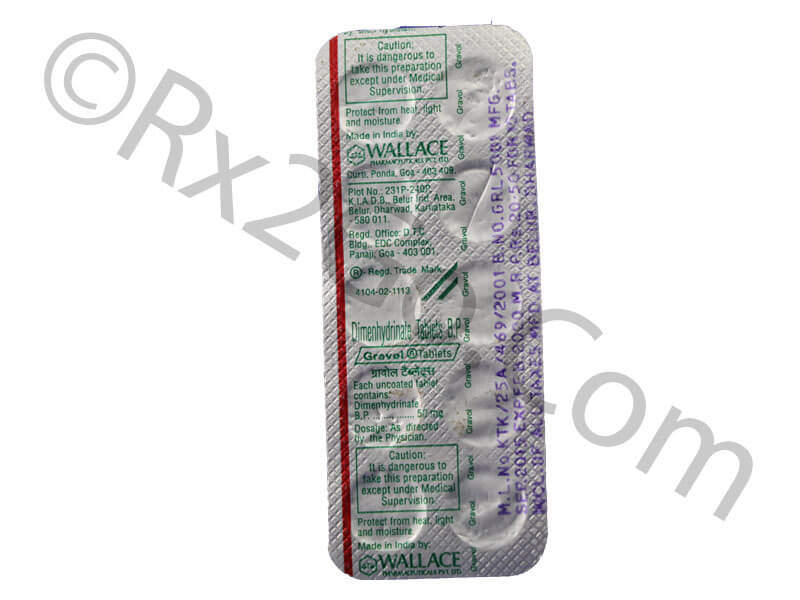Dimenhydrinate for Treatment of Motion Sickness Symptoms

Dimenhydrinate is an over-the-counter antihistamine medication that comes in several forms. It is used for the treatment and prevention of vomiting, nausea and dizziness due to motion sickness. It’s one of the most common motion sickness drug that you can buy over-the-counter. Dimenhydrinate is not a single drug but a combination of diphenhydramine and 8-chlorotheophylline. 8-chlorotheophylline is in the xanthine class of drug classified as stimulant.
What condition does Dimenhydrinate treat?
Dimenhydrinate is a first-generation antihistamines. It is designed for the treatment of motion sickness symptoms such as:
- Nausea
- Vomiting
- Dizziness
Aside from motion sickness, this medicine is also used for other conditions the cause stomach upset like:
- Radiation sickness
- Vertigo
- Meniere’s disease
How does Dimenhydrinate work?
- This drug belongs to the group of medication known as antiemetic. Antiemetic drugs helps ease the symptoms of nausea and vomiting. There are several types of antiemetic drugs, some of which are mainly prescribed for motion sickness and vertigo like Dimenhydrinate.
- Dimenhydrinate is an antiemetic drug designed specifically for the prevention of motion sickness and vertigo symptoms.
- It can stop motion sickness and vertigo symptoms by desensitizing the inner ear to the motion of the head. It interferes with the chemical signals in the brain that makes you feel dizzy.
- It blocks the histamine 1 (H1) receptor, which is present in great quantities throughout the brain.
- Suppressing the nerves in the inner ear and brain relieves nausea, vomiting and dizziness.
What is the dosage of Dimenhydrinate?
- The recommended dose is one to two 50mg tablet with a glass of water. Take it at least 30 minutes to 1 hour before you travel. Adults and older children should take this medicine every 4-6 hours to prevent motion sickness or as needed.
- For children age 6-12 years, take the chewable form every 6-8 hours or as needed. They may also take one-half to one entire 50mg tablet every 6 to 8 hours. The maximum dose is three tablets within 24 hours.
- Children below 2 years of age must not take this without consulting with the doctor.
How to take Dimenhydrinate?
- After taking this medicine, it is absorbed and reaches its maximum level in your system in about 2-3 hours. The effect is observable within 15-30 minutes after intake. The effects lasts for an average of 3-6 hours.
- You may take it with or without food.
- Swallow the tablet whole with plenty of water. For chewable tablet, chew the tablets well before swallowing.
- Taking Dimenhydrinate ahead of time works better than using it when vomiting and nausea has begun.
What are the precautions in taking Dimenhydrinate?
- Use this with care if you have:
- Mild to moderately decrease kidney and liver functions
- High blood pressure
- Raised eye pressure or open angle glaucoma
- Parkinson’s disease
- Blockage in the area where the stomach joins the intestines
- Rare hereditary blood disorders
- Enlarged prostate glands
- Overactive thyroid glands
- Asthma, emphysema or other breathing problems
- Do not use this if you have:
- Closed angle glaucoma
- Severely decreased kidney and liver functions
- Epilepsy
- Convulsion
- Difficulty passing of urine or urinary retention
- You are pregnant or breastfeeding
- Unlike other antihistamines, this drug is not used for allergies. It is solely prescribed for motion sickness. Do not use this in treating any allergies.
- This medicine should not be used in treating nausea due to cancer therapy.
- Dimenhydrinate can cause side effects. Common side effects are dizziness and sleepiness. Other side effects may include anxiety, excitement, nauseas, blurred vision, dry mouth, stomach discomfort, loss of appetite and insomnia.
- Side effects on children can be unpredictable. It is known that this causes to rev up the central nervous system of children instead of calming them down. As a result, children become restless.
- Stop taking this and seek medical help as soon as possible in case of serious side effects like, shallow, rapid breathing, seizure and allergic reactions.
- Do not use this if you are allergic to any of its ingredients.
- The safety of this medicine when used by breastfeeding or pregnant women has not been established. If you are pregnant or breastfeeding, do not use this without the advice if your doctor.
- Avoid using topical antihistamines called diphenhydramine.
- Avoid drinking alcoholic beverages as this can cause side effects such as drowsiness and dizziness. Avoid hazardous task until you know how this drug affects you.
- Do not give Dimenhydrinate to children below 2 years old. The use of this drug on children younger than2 years old can be dangerous.
- This medicine can make the symptoms of glaucoma worse. If you have glaucoma, do not take this without consulting with your doctor.
- People with prostate problems such as enlargement of the prostate must not use this medication as this can worsen the condition.
- This medication has abuse potential. Overdose of this drug can cause hallucination and euphoria because of an increase level of dopamine in the brain. Dopamine is a brain chemical which is closely related to addiction due to its reward system in the brain. However, compared with other abusive drug, this drug is marked as less addiction.
Costs of Generic Dimenhydrinate vs Dramamine
Dimenhydrinate is an inexpensive generic antihistamine used to treat the symptoms of motion sickness such as nausea, vomiting and dizziness. It is much cheaper compared with the brand name Dramamine. Dimenhydrinate 50mg cost $0.11 per unit price or $10.99 for 100 pills. While the brand name Dramamine cost $36.30 for 36 tabs or $1.01 per unit price.



